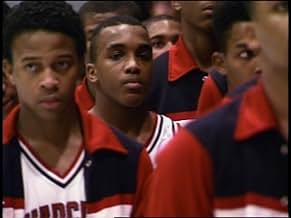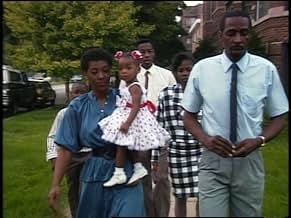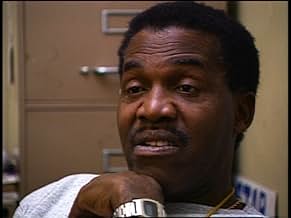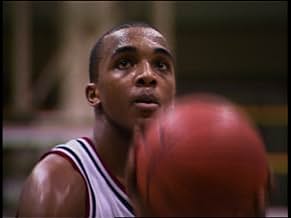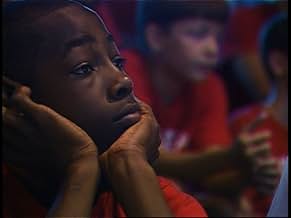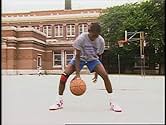NOTE IMDb
8,3/10
29 k
MA NOTE
Ajouter une intrigue dans votre langueA film following the lives of two inner-city Chicago boys who struggle to become college basketball players on the road to going professional.A film following the lives of two inner-city Chicago boys who struggle to become college basketball players on the road to going professional.A film following the lives of two inner-city Chicago boys who struggle to become college basketball players on the road to going professional.
- Nommé pour 1 Oscar
- 23 victoires et 9 nominations au total
Marlyn Hopewell
- Self - High School Guidance Counselor
- (as Sister Marlyn Hopewell)
Avis à la une
The filmmakers here show an admirable dedication to their art and to the underprivileged, spending five years tracking two kids, Arthur and William, and their dreams of basketball stardom. The two subjects and their families are simple and somewhat naive, in an endearing way. Their struggles, sometimes unflattering, are put forth for us to relate to, and we all can. Of course this is about two kids and their love for basketball, and about the "road to" that takes place as they try to get there, but it's really about the way people in near-poverty live, the education system and its downfalls, the manipulation of organized sports and tendency for people to try and achieve their goals through others (Arthur's father, William's brother), and the situation between blacks and whites in America. In one scene, Arthur laments being around mainly white kids for the first time in his life, and says it'll be difficult but he'll manage. That kind of relaxed confidence is so rewarding to watch. The film has endless insights into the black urban experience. Of course not every family in the ghetto is in a position where a father is a criminal and drug user, but when two kids in the same story are in that situation, it's got to be somewhat prevalent.
It's the kind of movie that's sustaining, and there are so many transcendent, revealing moments that stand out: Arthur's mother, such an inspirational woman to watch, as she gets her nurse certification; Arthur's family talking to another family in a cafeteria, with his mother high-fiving an elderly white lady; the descent into and path out of drug addiction; and a scene where the man who recruits these boys says that sometimes he has doubts about himself when he sees the pain that's a part of these kids' lives. Spike Lee makes a brief appearance giving a speech to the kids, and his pessimism is the only sore spot in the film.
We don't have to work for any of this, we don't have to question it. There's nothing to clean away before we can get to the real thing. This is the real thing. A curious moment, however, is one scene where Arthur's mother explains to us at one point she had her electricity cut off, which suggests that the crew wasn't there to film that period. But the next scene has her walking in the dark with a lamp, that seems like an undeclared "reenactment" of something they missed, for editing purposes. But the criticism of manipulation in documentaries is tired. Yes, the possibility of tricking an audience into believing something with a documentary is greater, but unless it's political in some respect it doesn't matter. Documentaries are supposed to be presented how the filmmaker sees fit. With no license, we'd have 350-hour documentaries.
At one moment near the end, William's coach says goodbye to him and as he walks out his coach mentions that that's the system: one goes out, another comes in. It feels like we're saying bye to a member of the family. This is a life-affirming experience, a family that should be visited again. 10/10
It's the kind of movie that's sustaining, and there are so many transcendent, revealing moments that stand out: Arthur's mother, such an inspirational woman to watch, as she gets her nurse certification; Arthur's family talking to another family in a cafeteria, with his mother high-fiving an elderly white lady; the descent into and path out of drug addiction; and a scene where the man who recruits these boys says that sometimes he has doubts about himself when he sees the pain that's a part of these kids' lives. Spike Lee makes a brief appearance giving a speech to the kids, and his pessimism is the only sore spot in the film.
We don't have to work for any of this, we don't have to question it. There's nothing to clean away before we can get to the real thing. This is the real thing. A curious moment, however, is one scene where Arthur's mother explains to us at one point she had her electricity cut off, which suggests that the crew wasn't there to film that period. But the next scene has her walking in the dark with a lamp, that seems like an undeclared "reenactment" of something they missed, for editing purposes. But the criticism of manipulation in documentaries is tired. Yes, the possibility of tricking an audience into believing something with a documentary is greater, but unless it's political in some respect it doesn't matter. Documentaries are supposed to be presented how the filmmaker sees fit. With no license, we'd have 350-hour documentaries.
At one moment near the end, William's coach says goodbye to him and as he walks out his coach mentions that that's the system: one goes out, another comes in. It feels like we're saying bye to a member of the family. This is a life-affirming experience, a family that should be visited again. 10/10
It runs for three hours but it feels much less, such is the power that this documentary holds. Absorbing, you get sucked in and the film has this grip on you.
If Reality TV is your thing, I'd seriously give this film a go, then you can stop watching Reality TV and start to recognise, understand and prioritise real-world situations that actually matter, like racism, poverty, drug abuse, peer pressure and well, dreams.
You'll fall in love with the characters, and there's even a bad-guy for us to boo. You can sometimes question the manipulative techniques on display, but the film is actually not as guilty as some, the makers have a genuine affection for their subjects and do as much as they can within the rules of documentary to help them out without compromising their objectivity.
Be that as it may, this film should be compulsory viewing for many younger audiences, as it shows you exactly how real life differs from the garbage that passes for representation of youth on TV and in film today.
I really can't say enough about the need for more films like this, the fact that the Academy Awards were changed because of the strength of this film goes some way to showing you exactly how powerful it is.
If Reality TV is your thing, I'd seriously give this film a go, then you can stop watching Reality TV and start to recognise, understand and prioritise real-world situations that actually matter, like racism, poverty, drug abuse, peer pressure and well, dreams.
You'll fall in love with the characters, and there's even a bad-guy for us to boo. You can sometimes question the manipulative techniques on display, but the film is actually not as guilty as some, the makers have a genuine affection for their subjects and do as much as they can within the rules of documentary to help them out without compromising their objectivity.
Be that as it may, this film should be compulsory viewing for many younger audiences, as it shows you exactly how real life differs from the garbage that passes for representation of youth on TV and in film today.
I really can't say enough about the need for more films like this, the fact that the Academy Awards were changed because of the strength of this film goes some way to showing you exactly how powerful it is.
10Cobbler
This gets my vote for the best movie of all time!! I know, it sounds crazy to say that about a documentary, but to me, this film has more drama, truth, realism & emotion than a thousand Hollywood movies put together. I've seen it over 30 times, and it never ceases to gladden my heart to see Arthur & William's story. The scene where Arthur's mom receives her diploma from nursing school has to be one of my all time favorites. For me, this is one of the rare three-hour movies that I never wanted to end. 10/10.
"Basketball is a ticket out of ghetto." (William Gates)
"... nobody cares about you. You're a black, you're a young male... The only reason why you're here [Nike training camp] is so you can make their team win. And if the team wins these schools get a lot of money." (Spike Lee)
These phrases, which have persisted as common knowledge among the African-American community during last several decades, have become familiar to the non-hyphenated Americans in the 90s, thanks to the films such as Boyz N the Hood and He Got Game. Among them, Hoop Dreams, a documentary that follows two black youths during a five-year period, is the most objective and the most quiet, but the most powerful statement to represent the disadvantaged youth in urban America.
The film reveals the pattern they follow. Being deluded by the luxurious surface of pro sports, they neglect education and then ending up going nowhere. The community suffers the vicious cycle and their feelings that the system exploits them remain.
Kudos to the filmmakers for their insane amount of work. They must have gone through numerous negotiations to attend and film various scenes, such as family's private events, classrooms, academic counseling, recruiting sessions with college coaches, and surgery operation rooms.
"... nobody cares about you. You're a black, you're a young male... The only reason why you're here [Nike training camp] is so you can make their team win. And if the team wins these schools get a lot of money." (Spike Lee)
These phrases, which have persisted as common knowledge among the African-American community during last several decades, have become familiar to the non-hyphenated Americans in the 90s, thanks to the films such as Boyz N the Hood and He Got Game. Among them, Hoop Dreams, a documentary that follows two black youths during a five-year period, is the most objective and the most quiet, but the most powerful statement to represent the disadvantaged youth in urban America.
The film reveals the pattern they follow. Being deluded by the luxurious surface of pro sports, they neglect education and then ending up going nowhere. The community suffers the vicious cycle and their feelings that the system exploits them remain.
Kudos to the filmmakers for their insane amount of work. They must have gone through numerous negotiations to attend and film various scenes, such as family's private events, classrooms, academic counseling, recruiting sessions with college coaches, and surgery operation rooms.
"Hoop Dreams" brilliantly follows multiple parallel stories, bringing the viewer into the lives of two families of inner-city kids looking for a chance at the "big time", their ticket out of the ghetto. Although the main focus is on William Gates and Arthur Agee, their "supporting cast" is equally enthralling. From William's jaded brother Curtis, sublimating his own basketball aspirations to the reality of his blue-collar mailroom job, to Arthur's indomitable mom Sheila, doing the impossible every day as she keeps her troubled family together, there are a thousand reasons to cheer, laugh, cry, and rage packed throughout this amazing, inspirational, cautionary documentary.
By examining not only the players but also their families and environments, we are given a clearer view of their aspirations and motivations, what they plan to achieve and what they wish to avoid.
I will not summarize or elaborate further. If you have not seen this movie, put it on the short list. 9/10.
By examining not only the players but also their families and environments, we are given a clearer view of their aspirations and motivations, what they plan to achieve and what they wish to avoid.
I will not summarize or elaborate further. If you have not seen this movie, put it on the short list. 9/10.
Le saviez-vous
- AnecdotesAccording to Roger Ebert, after the film failed to receive an Oscar nomination for Best Documentary, he and Gene Siskel learned about the nominating process. He said that members of the Academy's documentary committee held flashlights when they watched documentaries, and anyone who had "given up" could wave it against the screen. The movie was turned off if a majority waved their flashlights. This film was turned off after 15 minutes.
- Citations
William Gates: That's why when somebody say, "when you get to the NBA, don't forget about me", and that stuff. Well, I should've said to them, "if I don't make it, don't you forget about me."
- Crédits fousThanks to the St. Joseph High School community and Coach Gene Pingatore who agreed to participate in a not for profit Kartemquin Educational film telling William and Arthur's stories. Today, St. Joseph, with a 39% minority enrollment, remains committed to the dream of a better life for all. Awarding need based financial aid to 40% of its students, St. Joseph with limited resources continues to maintain its academic excellence. A Hoop Dreams Fund has been set up to provide academic scholarships.
- Bandes originalesIn This Very Room
Words & Music by Ron & Carol Harris
© 1979 Ron Harris Music (ASCAP)
All Rights Reserved.
All Rights Reserved. International Copyright Secured. Used by Permission.
Meilleurs choix
Connectez-vous pour évaluer et suivre la liste de favoris afin de recevoir des recommandations personnalisées
- How long is Hoop Dreams?Alimenté par Alexa
Détails
Box-office
- Budget
- 700 000 $US (estimé)
- Montant brut aux États-Unis et au Canada
- 7 830 611 $US
- Week-end de sortie aux États-Unis et au Canada
- 18 396 $US
- 16 oct. 1994
- Montant brut mondial
- 11 830 611 $US
- Durée2 heures 50 minutes
- Couleur
- Mixage
Contribuer à cette page
Suggérer une modification ou ajouter du contenu manquant





